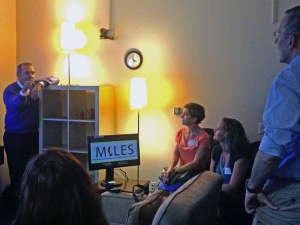NATO Mental Health Group Visits School
November 20, 2013 / by Claudia Bustamante- Research
Most national militaries have challenging basic training programs to ensure new members' physical fitness. Few, however, devote as much time to mental health.
And that may come as a detriment. A growing body of research suggests that targeted mental health training lessens the likelihood of later showing symptoms of post-traumatic stress and depression, or of sleep and substance problems for active duty service members and veterans.
Since 2011, a NATO research task group comprising social workers, psychologists, psychiatrists and military trainers from 10 countries has been probing this area.
“If you’re going to teach basic resilience training skills, what would those be?” asked USC’s Carl Castro, chair of the NATO group and a retired colonel in the U.S. Army. “Everything we identified can transcend nationalities.”
Some of the basic techniques the group identified include technical breathing to help calm oneself down and sleep management skills, especially for environments that are meant to restrict sleep, said Castro, who is also an assistant professor with the USC School of Social Work and director of research for the school's Center for Innovation and Research on Veterans & Military Families (CIR).
The NATO group—represented by the United States, the United Kingdom, the Netherlands, Canada, Latvia, Estonia, Spain, Germany, Belgium and the Czech Republic—held its final meeting in October at the USC School of Social Work. They will spend the coming months finalizing a mental health training manual.
The Los Angeles visit also included demos of CIR’s innovative teaching tools that allow Master of Social Work students to become skilled in core concepts of behavioral health therapy without the fear of alienating a veteran, service member or military family member.
An example is Motivational Interviewing Learning Environment and Simulation (MILES), a virtual standardized technology that allows students to guide a therapy session with an avatar based on a list of multiple-choice options.
Sandra Landratova, a clinical psychologist from Latvia, said the technology is a good introduction to skill-building and brings learning to a new level, but wondered if students could become overly confident in the virtual world.
Anthony Hassan, director of CIR, told the NATO group that the center is constantly working to expand the scenarios to ensure against that. Also, its most innovative technology—the Virtual Patient—has the ability to respond to open-ended questions. The artificially intelligent simulation is currently limited in the amount of questions it recognizes, but the center hopes to expand its brain capacity and responsive body language in the future.
"We want this to be the first five minutes of a session. We want this to be realistic. We want the student to be as uncomfortable as possible so that they’re ready when they meet a veteran in session," Hassan said.
The NATO group also saw applications of this innovative training outside of the classroom.
"It could definitely be used in the field with a leader asking a subordinate and trying to figure out what's going on," said Suzanne Bailey, a senior social worker from Canada.
To reference the work of our faculty online, we ask that you directly quote their work where possible and attribute it to "FACULTY NAME, a professor in the USC Suzanne Dworak-Peck School of Social Work” (LINK: https://dworakpeck.usc.edu)
